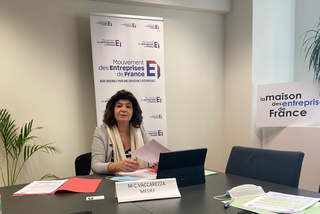
Marie-Christine Vaccarezza, Head of Office, MEDEF
French EU Council Presidency: "Business expect concrete results”
Presidential and parliamentary elections are due in France. What role does Europe and the French EU Council Presidency play in the election campaign?
France is living an unprecedented political situation with two major ballots during our EU Presidency: one for the election of the new President (10 and 24 April) and another for the elections of our new parliament (12 and 19 June). As an unexpected consequence of Brexit and of the Covid crisis, in the current campaign, no one asks any more for France leaving the EU (so-called FREXIT) or for the end of the euro. The question is to improve Europe but not to question its achievements. At this stage, Europe and the French Presidency are not on top of the political programs but paradoxically enough, the issues at stake in the debates demand a common European solution: energy prices, migration, sovereignty, greening the economy, skills and how to protect our citizens from international threats.
What can business expect from the French EU Council Presidency?
Business expect concrete results. In an official report issued in January, a reflexion committee installed by the government insisted that our presidency should be more in the spirit of Robert Schuman than of Victor Hugo. Of course, we need a strong and global vision for the future of Europe which implies to rethink our growth path to a decarbonised economy. But the priority is to progress, as a realistic and honest broker on the key legislative files on the table, taking into account the competitiveness of our companies.
What are the three top priorities of French employers regarding the Council Presidency?
MEDEF has three key priorities:
- Act for a competitive decarbonised Europe and strengthen its sovereignty with a Carbon Border Adjustment Mechanism (CBAM), Digital Services Act (DSA), Digital Markets Act (DMA), anti-coercion instrument, International Procurement Instrument (IPI), the implementation of OECD tax reforms and Chips act;
- act for an efficient Europe avoiding any legislative burden on companies and
- better connect citizen to the European project.
What are MEDEF’s main expectations of the new German government in terms of EU politics?
Germany has a key role to play in the coming months: both in the G7, that Berlin currently heads, and in the EU. We hope that the new German government continues its strong commitment to Europe. All the major challenges European nations will have to face such as the ecological transition and energy costs, strategic autonomy (from health to semi-conductors), skills, international tensions or migration, require a strong and coherent EU answer.
What is your personal vision for the future of the EU?
The future of Europe will not depend on a new institutional framework or on a major political move. Rather, it will depend on our collective capacity to develop a strong industry and jobs in Europe which is the prerequisite for the future of our European model. Make our Europe strong again should be our motto.



